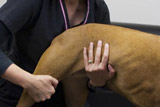The term "socialization" is a sometimes over-used but appropriate term when it comes to describing what should be done with a new puppy less than 12 weeks of age in your home. The word says it all. It basically means that the puppy needs to be exposed at this age to as much as possible. Everything that he is exposed to during this period in his life (six to 12 weeks of age) will be more easily absorbed into his "mental picture" of the world than at any other time of his life.
People who are well versed in dog training will tell you that this is the time for taking the puppy everywhere. A person who is wanting to have a dog that is completely stable, a dog that is unflappable, will make every effort to take the puppy into as many new and different situations as possible. Consider taking the dog to a zoo, or going to a parade. Expose him to the noises at an airport. Persons who live in the country are often at a disadvantage as far as exposure to noise; they should consider driving to the mall or other city scenarios. Don't pass by any opportunity to get the puppy out and about. Especially take him to a playground and encourage him to go up on the stairs of the slides and over the swaying or moving parts of the playground equipment. Another excellent means of socializing is to take the puppy into a pet store. This is one of the few areas where dogs are welcome inside of stores and there are many other animals there such as birds, ferrets and so on.
This is also the time to teach the puppy what "tone of voice" means and even what certain words mean. It is amazing what actual words a dog can learn. Sometimes a person may feel that he is making a fool of himself praising his dog and talking in a baby talk sort of voice, but most likely he is improving his relationship with his dog and improving the dogs ability to process vocabulary. People who find themselves talking to their dogs as they would talk to their children may not realize it, but they are enriching their dog's ability to learn. Many adult dogs have "vocabularies" of more than 100 words and can learn to respond to complete sentences. The puppy should learn that positive approval and a happy tone of voice is rewarding to him in the form of a treat or praise and that disapproval means an unhappy tone of voice and no reward. He is certainly not too young to at least learn to "sit" and to "down". He will react quickly to positive training and it is amazing how fast he will learn that if he sits he gets his food, or if he sits he will be petted. Conversely he can also learn at this time that if he nips he will be ignored and his playmate will go away...or if he jumps on a human he will be effectively rebuffed with a shake to his scruff or a resounding "NO!"
In the end, whether or not a person is ever able to enroll his dog in any obedience classes for formal training, if he will do all the socializing that he can do during the early months of his dog's life it will enrich all the future training that he does.

 Cooling Vests For Dogs
Dogs feel the heat just like
Cooling Vests For Dogs
Dogs feel the heat just like
 The Benefits of Giving Your Dog Chew Toys and Treats
Credit: Peter Griffin
The Benefits of Giving Your Dog Chew Toys and Treats
Credit: Peter Griffin
 Learn How to Tell if Your Dog or Cat is Obese and in Poor Health
Is your Dog Healthy?Dog and
Learn How to Tell if Your Dog or Cat is Obese and in Poor Health
Is your Dog Healthy?Dog and
 Hip Dysplasia in Dogs
Hip Dysplasia in Dogs
Hip Dysplasia in Dogs
Hip Dysplasia in Dogs
 Tips For Renting With Pets: Finding a place to live with your dog
Tips For Renting With Pets
I have been owned by dogs for ov
Tips For Renting With Pets: Finding a place to live with your dog
Tips For Renting With Pets
I have been owned by dogs for ov